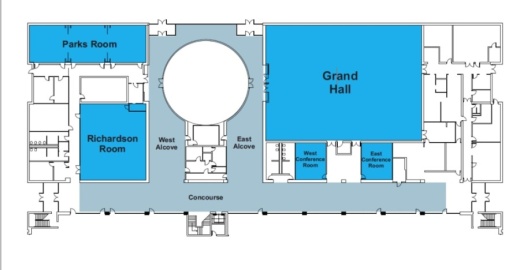The center is used to host city events but is also available for private rentals. At 13,750 square feet, it takes up about 23% of City Hall, Assistant City Manager Shanna Sims-Bradish said during a Nov. 16 presentation to council.
Five areas within the center are available to rent for between $300 and $1,800. Room rates have not been adjusted for at least six years, said Lori Smeby, the director of the Richardson Parks and Recreation Department.
Civic Center rates are far lower than a hotel's average rental rate for rooms of comparable size. A room equal in size to the Civic Center’s 2,300-square-foot Grand Hall, for example, would cost, on average, more than $8,000 to rent, Smeby said.
“You see a big difference there, and understandably so,” Smeby said. “Our hotel partners do have a different agenda or different goals when they rent.”
Council Member Kyle Kepner said he felt rates should be adjusted so the city would at least break even on operational costs.
“I understand being less than everyone because we are a government [building], but a quarter of what everyone else is charging is perhaps way too low,” Kepner said.
Mayor Paul Voelker agreed the city should take a closer look at the cost of operating the center and adjust rates accordingly but should still aim to charge less than the private sector.
“I don’t want to compete with the event centers, the hotels, or even, quite candidly, a house of faith,” Mayor Paul Voelker said. “That’s revenue for them.”
In the two fiscal years preceding the COVID-19 pandemic, revenue brought in by events came in below the cost of running the center. In fiscal year 2018-19, the city spent more than $1 million on center operations but brought in only $354,884, Smeby said. That same year, only about 68% of available booking units, or times when rooms in the center were available for rent, were reserved, Smeby said.
Despite these challenges, the Civic Center is beneficial to the city in some ways. For one, the availability of the center prevents the city from having to spend money on renting private-sector space for its own events, such as the Corporate Challenge or the National Night Out kickoff event, City Manager Dan Johnson said.
“We have to be eyes open about—if we were to displace them and have to go to the general market for that—what would be the new expense?,” he said.
Staff asked council to consider four potential options for the future of the center. The first option would continue operations as is. This would serve to maintain client relations and could provide some leasing revenue for the city, Sims-Bradish said.
The second option would also keep the center in the building but would relegate operations to either the north or west sides of City Hall. This would help address safety concerns posed by having private events held near city offices, Sims-Bradish said.
The third option would involve moving the Civic Center to a location outside of City Hall. If council were to pursue this option, it is likely center operations would have to be paused until the ideal location is found, Sims-Bradish said.
“There are a lot of unknowns on this [option],” she said. “A financial investment would need to be made in a capital asset in some form or fashion.”
Voelker said he was in support of moving the center to another location, not only because of security reasons, but also because of limited operational funding imposed by Senate Bill 2, which reduced the amount of property tax revenue available to municipalities.
“The reality is that in an SB 2 world, relatively speaking, capital is available to us for projects; operations and maintenance isn’t,” he said. “We probably have the money to build it, but do we have the money to operate it?”
The fourth option would be to discontinue Civic Center operations. The displacement of city events has an estimated annual impact of $135,000, Sims-Bradish said.
Council Member Mark Solomon questioned the relevance of the Civic Center in today’s world. It was originally included in the plans for City Hall to provide meeting space for groups such as the local chamber of commerce and Rotary Club, which now have many other options for places to gather, Solomon said.
“You have to take into consideration why we put it in here originally,” he said. “Those things have changed over the years. We built the Eisemann Center with the hotel next door.”
No one on council was prepared to embrace the fourth option and abandon the Civic Center altogether. Staff was directed to return with a more thorough cost analysis and potential design strategies in January.





